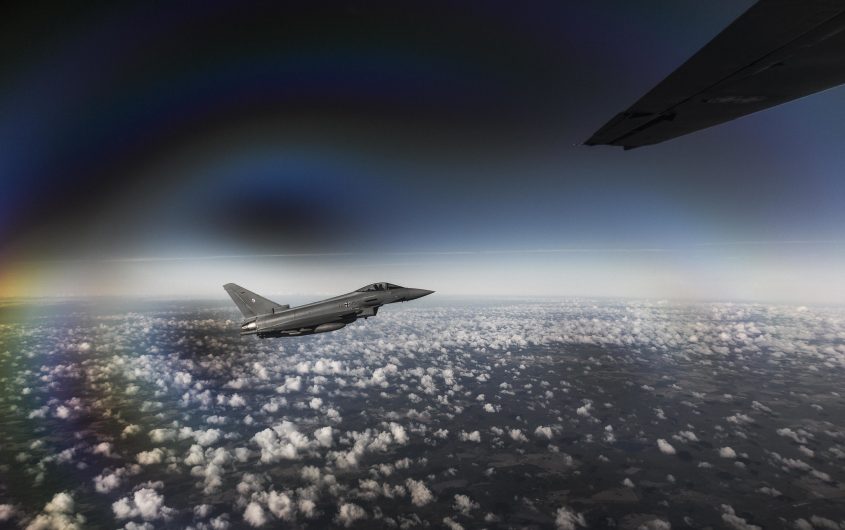
The Future of Transatlantic Security Cooperation: Past Successes and Emerging Threats

Gale Mattox
Senior Fellow
Dr. Gale A. Mattox is a Senior Fellow at AGI. She was previously Director of the Foreign & Security Policy Program at AICGS and a Professor in the Political Science Department at the U.S. Naval Academy. She is a former elected department chair and chair of chairs, and was awarded the Distinguished Fulbright-Dow Research Chair at the Roosevelt Center in the Netherlands 2009, Fulbright Scholar for NATO Strategic Studies in Brussels in Summer 2017, and Woodrow Wilson International Center for Scholars Fellow in 2016-17. Dr. Mattox served on the Policy Planning Staff of the Department of State, was a Council on Foreign Relations Fellow at the State Department Office of Strategic and Theater Nuclear Policy, and an International Affairs Analyst at the Congressional Research Service.
She has been a Bosch Fellow in Germany (also Founding President of the Bosch Alumni Association), NATO Research Fellow, and a Fulbright PhD Scholar. Dr. Mattox has held the offices of President (1996-2003) and Vice President of Women in International Security (WIIS); Adjunct Professor, Center for Peace and Security Studies at Georgetown University; and served as Vice President of the International Studies Association and co-chair of the ISA Women’s Caucus.
She has served on numerous boards, including the Tactical Advisory Council, Center for Naval Analysis, and the George Marshall Center Advisory Board in Germany; the advisory boards of St. Mary’s College Women’s Center, the Forum for Security Studies at the Swedish National Defense University, and WIIS. Dr. Mattox published Coalition Challenges in Afghanistan: The Politics of Alliance with S. Grenier, Enlarging NATO: The National Debates with A. Rachwald, and Evolving European Defense Policies with C. Kelleher. She is the co-editor of Germany in Transition, Germany at the Crossroads, and Germany Through American Eyes, and has published widely in scholarly journals. She holds numerous awards and has appeared on the Lehrer News Hour and other media outlets. She holds a PhD from the University of Virginia.
__
The AGI-BAKS Transatlantic Series “The U.S. and Germany: Partnership under Stress” held its fourth and final workshop, “The Future of Transatlantic Security Cooperation: Past Successes and Emerging Threats,” on November 20, 2019, at Dentons law firm in Washington, DC. The three previous workshops had been convened in Washington, DC; Hamburg (Führungsakadamie); and Berlin (German Ministry of Defense). Over 200 German and U.S. foreign and security experts participated in the four day-long workshops to discuss transatlantic issues and the state of the relationship.
A “Brain-Dead” NATO? Alliance Missions and Future Operations?
The initial panel opened with deliberations on current Alliance missions as NATO faced its seventy-year anniversary with an allied heads of state meeting in London. President Emmanuel Macron’s moniker of NATO as “brain-dead” received close scrutiny in an in-depth discussion of the Enhanced Forward Presence where one expert countered that “the ‘brains’ of NATO continue to thrive in the form of well-conceived strategy, planning, and operations while the metaphorical ‘heart’ is the element at risk, albeit not anywhere close to an end.” The need is for a less regionally segmented strategy and a more cohesive strategy for all of NATO’s five theaters.[1] Given the NATO Enhanced Forward Presence in the Baltics/Poland, discussion delved into the current threats and suggested several potential responses, including increased defense spending, U.S. permanent boots on the ground (as opposed to rotational forces), improved understanding of Russian regional strategy and the role of Kaliningrad within that strategy, and improved lines of communication with Russia to avert misunderstandings.
Discussions of threats confronting NATO ranged from terrorism to emerging Russian and Chinese threats to the likelihood of a return to great power competition. Is/will this power dynamic be in U.S. interests? What role will Germany play? The potential impact of the threats drew debate from participants of both sides of the Atlantic without resolution amid robust discussion. In terms of future operations, it was agreed that the rise of innovative technologies—hybrid threats, “dual-use” technologies, resource scarcities, misinformation activities, and energy, among other emerging challenges—require more attention to counter and address future threats. In particular, cybersecurity emerged as a dynamic challenge in the future. Expert participants underlined the fast pace and difficulties cyber may pose not only on the battlefield, but, even more threatening, to allied political cohesion.
The increase of challenges out-of-area requiring response from NATO members prompted a debate over NATO’s role in Afghanistan. As the longest conflict in history for the majority of allied and coalition members, Afghanistan, most participants agreed, needs an exit strategy. But the terms for such a strategy diverge at this point, particularly with respect to members of the negotiations, but also, going forward, on territorial disputes, governance, and a range of other difficult issues. Also, NATO allies confront disturbing unresolved issues in the Balkans, the threat from the ongoing Ukrainian conflict, and the Enhanced Forward Presence in the Baltics and Poland all require close coordination and consultation among the allies and partners and with the United States. Both the U.S. and German participants pointed to management of current issues in Iraq, Iran with the U.S.-led pull-out from the 2015 JPCOA, Libya, and Syria, as well as defining NATO’s role in the anti-ISIS coalition.
Transatlantic Cooperation and Great-Power Competition
Discussion of current on-the-ground operations moved in the second panel to a broader consideration of Great Power Cooperation from the perspective of the U.S.-China relationship. Based on a seemingly accepted premise of an evolving challenge in the formulation of European policy toward China, particularly on interests beyond economics and trade, there was divergence of opinions on its impact on U.S.-German relations in the area of security. Debate over the direction of cooperation between Germany and the U.S. with respect to an appropriate China approach had begun in the concluding conversations at the Berlin Ministry of Defense during the June 2019 Workshop. Clear consensus on relations with China emerged on the need for greater coordination between the U.S. and Germany on the approach toward China, but there remained open questions with regard to the direction such an approach should take.
In sum, the lack of consideration of U.S.-German differences with China remained focused on the economic and technological differences without consideration of hard security issues that embroil the transatlantic allies in active debate. At this point and mentioned in the discussion, the potential for even the evolving Belt and Road Initiative (BRI) to challenge Europe from a security perspective is often overlooked or minimized. The BRI resurfaced in the next panel with a warning that it is not a “win-win” for Europe, as China maintains,
Transatlantic Approaches to an Adversarial Russia
The third panel continued the issue of Great Power Competition with a focus on Russia. An early challenge to the title of the panel questioned whether Russia is, in fact, an adversary. Is this designation unproductive and limiting for the discussion? Rather, in the view of another participant, might Russia perhaps more accurately be understood as a potential and future adversary if cooperative approaches on a broad range of security and foreign policy are not explored? A German participant argued against cancelling or ignoring international treaties and supporting, rather, greater diplomatic outreach to find areas of overlapping interests. An unknown factor, several agreed, will be how Putin will exit office.[2]
From the perspective of the United States, there is a bifurcated policy on Russia which on a number of issues splits the president from the executive branch and U.S. Congress. As the Intermediate-range Nuclear Forces Treaty (INF) violations demonstrated, willingness to pursue serious arms control led by the U.S. in the future will be a critical element in relations, most strikingly in 2021 when New Start will expire, ending the final bilateral arms control agreement with Russia. Otherwise, current arenas for serious cooperation are limited and have withered, leaving only military channels of communication aside from trade ties. This prompted a German participant to underscore the vital need to maintain and improve diplomatic channels to Russia.
Future Framework for Transatlantic Security Cooperation
The final panel mirrored in many ways the London meeting only weeks away, introducing a number of the topics discussed by the NATO heads of state in December 2019. Topics in this final session included China and the direction it potentially could take in the future with implications for transatlantic relations. Both the impact of a China headed for regime change in an indeterminate future and Russia anticipating change without Putin prompted active debate by Workshop experts. Furthermore, one participant pointed out, a very different European security order could emerge with new players and underlying ideologies should the current increasing trajectory of the right-wing continues to grow.
Articulated by a German participant, such a new order could have several contradictory “drivers,” including an enhanced U.S. self-perception; shifting allied member states becoming consumed by domestic issues; differing perceptions of “common values,” i.e., in relations with Turkey, Saudi Arabia, and others; different “takes” on the role and importance of multilateral institutions; and, a red flag, “nuanced” approaches to Article 5 as NATO members shifted security priorities. At this point, a debate emerged on the future direction of recent EU initiatives. A former U.S. official opined, it was totally “unrealistic” to expect the EU Common Security and Defense Policy to emerge as a reliable and serious counter to security threats,[3] a charge that was rebuffed by a German participant who argued that the missing element was leadership.
Robust discussion of future directions for transatlantic security cooperation emphasized that the days of the Fulda Gap as the primary Soviet challenge were over and the structures designed for the Cold War were no longer the “right ones.” As now constructed, neither the transatlantic nor European institutions are sufficiently prepared to confront threats posed to the future allied security framework, including the current Russian military modernization and their bold annexation of Crimea, North Stream I and II, cyber/hybrid, or AI advances, to name only a few. A new Strategic Strategy to address emerging issues repeatedly surfaced. In sum, as one participant commented, recognition of the need for closer transatlantic dialogue and collaboration will be critical in assuring the future allied security framework.
The U.S. and Germany: Partnership under Stress
Transatlantic Workshop Series 2018-19
Sponsored by AGI/BAKS
WORKSHOP I: Leadership in U.S.-European Relations
WORKSHOP II: Requirements for Transatlantic Action: Building a Modern Military
WORKSHOP III: The United States and Europe: The Need for Adaptation
WORKSHOP IV: The Future of Transatlantic Security Cooperation: Past Successes and Emerging Threats
This workshop was held under Chatham House rules.
[1] High North, Baltic, Black Sea, Mediterranean/North Africa, and Transatlantic.
[2] At this point, the Putin-initiated changes in the Prime Minister and other officials were not to occur until January 2020. Panelist discussion of Russian historical revisionist views foreshadowed the changes to come six weeks later.
[3] As an indication of lack of common perceptions, one American participant pointed to a recent speech on the Berlin Wall by the German foreign minister that omitted mention of the United States.









